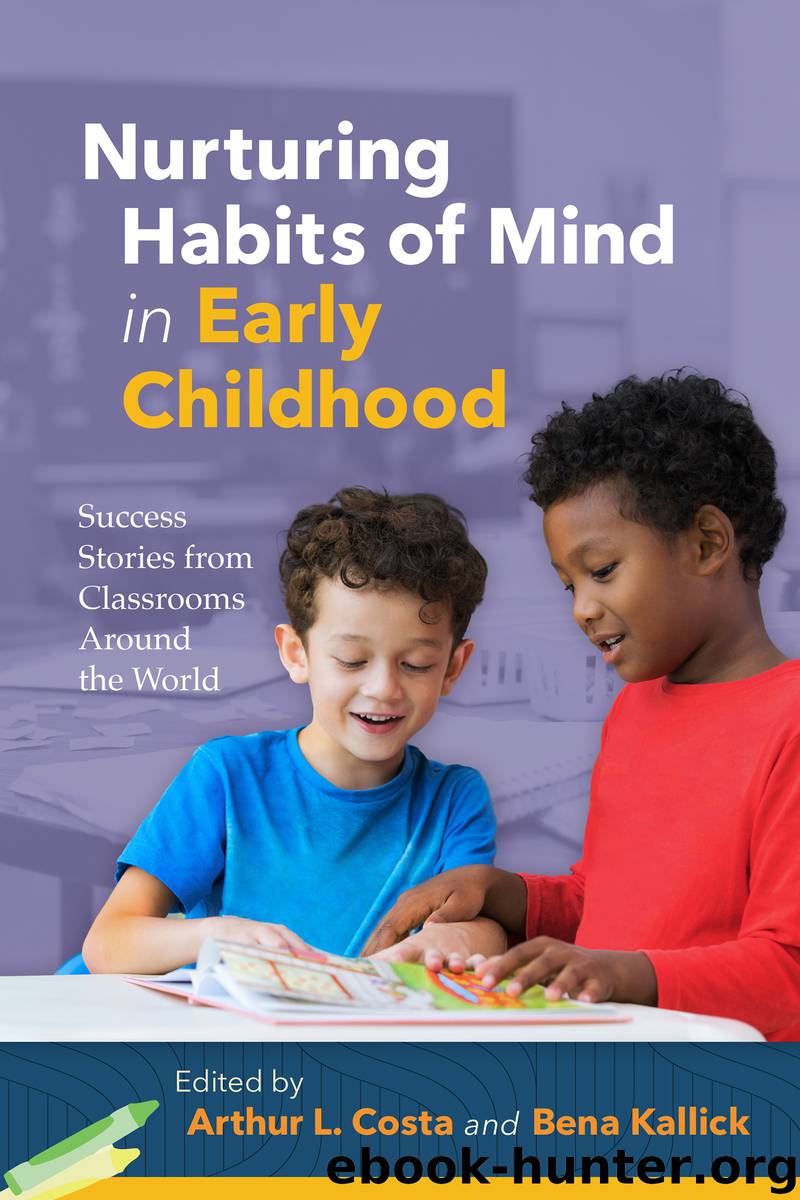Nurturing Habits of Mind in Early Childhood by Arthur L. Costa

Author:Arthur L. Costa
Language: eng
Format: epub
ISBN: 9781416627111
Publisher: ASCD
Published: 2019-01-31T16:00:00+00:00
LAF Strategy 3: Activities Must Include Higher-Order Thinking
By incorporating higher-order thinking skills in teaching, students are met with a challenge from the first day of class, and therefore they are immediately putting into practice the use of language to think and to analyze. All Habits of Mind include higher-order thinking skills, as they are the practices we want to employ when addressing a problem for which the answer is not immediately apparent. I tend to concentrate primarily on the habit of thinking flexibly with young learners, though questioning and posing problems and thinking about thinking (metacognition) are strong second and third featured habits in my higher-order thinking activities.
One of many thinking activities I do with young learners is one I learned way back in my bilingual kindergarten teacher days. The activity is called "I've Got Something in My Pocket." In this activity, which is adaptable to any language level and content area, the teacher first models by pulling an imaginary object out of her pocket and pretending to use it in some way that makes it obvious what that object is. For example, I have often pulled an imaginary car out of my pocket and mimicked myself driving so that the children could guess the word car. In order for the activity to encourage both thinking flexibly and thinking interdependently—and to also encourage the use of complex language—I usually start with easy-to-guess real objects and move on to more difficult concepts that involve a lot of guessing and imagination. For example, after I pull a car out of my pocket and give each child a chance to pull something imaginary out of his or her pocket for the class to guess, I change the rules by saying something like, "OK, now put your extra-powerful thinking caps on because I am going to pull a past event out of my pocket instead of a thing." Once we all understand what a "past event" is, I can pull a visit to the library out of my pocket, or a holiday party. It can get increasingly complicated with pulling all kinds of things out of my pocket, such as "kindness" or "jealousy." Young children are great at thinking flexibly, and during this activity they get to practice this habit along with listening, speaking, and negotiating meaning. They also practice questioning and cooperating skills as they guess what I've pulled out of my pocket and modify their guesses based on other children's guesses and my responses.
Download
This site does not store any files on its server. We only index and link to content provided by other sites. Please contact the content providers to delete copyright contents if any and email us, we'll remove relevant links or contents immediately.
The Art of Coaching Workbook by Elena Aguilar(51142)
Trainspotting by Irvine Welsh(21616)
Twilight of the Idols With the Antichrist and Ecce Homo by Friedrich Nietzsche(18608)
Fangirl by Rainbow Rowell(9216)
Periodization Training for Sports by Tudor Bompa(8238)
Change Your Questions, Change Your Life by Marilee Adams(7721)
This Is How You Lose Her by Junot Diaz(6860)
Asking the Right Questions: A Guide to Critical Thinking by M. Neil Browne & Stuart M. Keeley(5743)
Grit by Angela Duckworth(5582)
Red Sparrow by Jason Matthews(5453)
Paper Towns by Green John(5165)
Room 212 by Kate Stewart(5093)
Ken Follett - World without end by Ken Follett(4708)
Housekeeping by Marilynne Robinson(4425)
The Sports Rules Book by Human Kinetics(4369)
Double Down (Diary of a Wimpy Kid Book 11) by Jeff Kinney(4253)
Papillon (English) by Henri Charrière(4239)
The Motorcycle Diaries by Ernesto Che Guevara(4076)
Exercise Technique Manual for Resistance Training by National Strength & Conditioning Association(4049)
